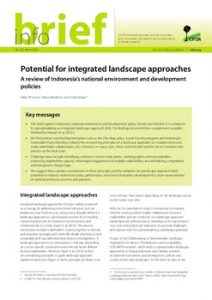 Alida co-authored three infobriefs that have been published recently by CIFOR assessing the potential for integrated landscape approaches in Indonesia, Ghana and Zambia. These briefs explore the three landscape’s national environment and development policy climate and whether it is conducive to operationalizing an integrated landscape approach (ILA). Some of the important findings from these reviews are-
Alida co-authored three infobriefs that have been published recently by CIFOR assessing the potential for integrated landscape approaches in Indonesia, Ghana and Zambia. These briefs explore the three landscape’s national environment and development policy climate and whether it is conducive to operationalizing an integrated landscape approach (ILA). Some of the important findings from these reviews are-
- Policies and development plans such as the One Map policy, Social Forestry program, and Indonesian Sustainable Palm Oil policy embody the overarching principles of a landscape approach (i.e. multiple land uses, multi-stakeholder collaboration, etc.). However, in many cases, these well-intended policies do not translate into practice at the local scale. Challenge areas include: identifying common concern entry points, clarifying rights and responsibilities, enhancing stakeholder capacity, meaningful engagement of multiple stakeholders, and identifying a negotiated and transparent change logic.
- Ghana’s policy framework is geared towards large-scale, near-term development, raising questions regarding environmental impacts and related socioeconomic reverberations. Concerns surrounding future development plans stem from Ghana’s past and present challenges with competing land uses. Ghana has many policies and management schemes that support reconciling conservation and development needs; however, barriers to implementation persist. Challenge areas include: establishing a transparent change logic that is understood and endorsed across sectors and stakeholder groups. This requires identifying common concern entry points and clarifying rights and responsibilities.
- Zambia’s national development plan and environment and development policies are characterized by three themes: diversification, decentralization, and integration. This suggests favorable conditions for operationalizing a landscape approach, however, putting these policies into practice remains a challenge.
Challenge areas include: clarifying rights and responsibilities, strengthening stakeholder capacity, and identifying a negotiated and transparent change logic that resonates at the national, regional, and local scale. - The team suggests a greater commitment to these principles and the adoption of a landscape approach holds potential to enhance policy performance and equitable natural resource management in the three countries.
The three infobriefs are available here-
- Indonesia: https://www.cifor.org/knowledge/publication/7955
- Ghana: https://www.cifor.org/knowledge/publication/7953
- Zambia: https://www.cifor.org/knowledge/publication/7954